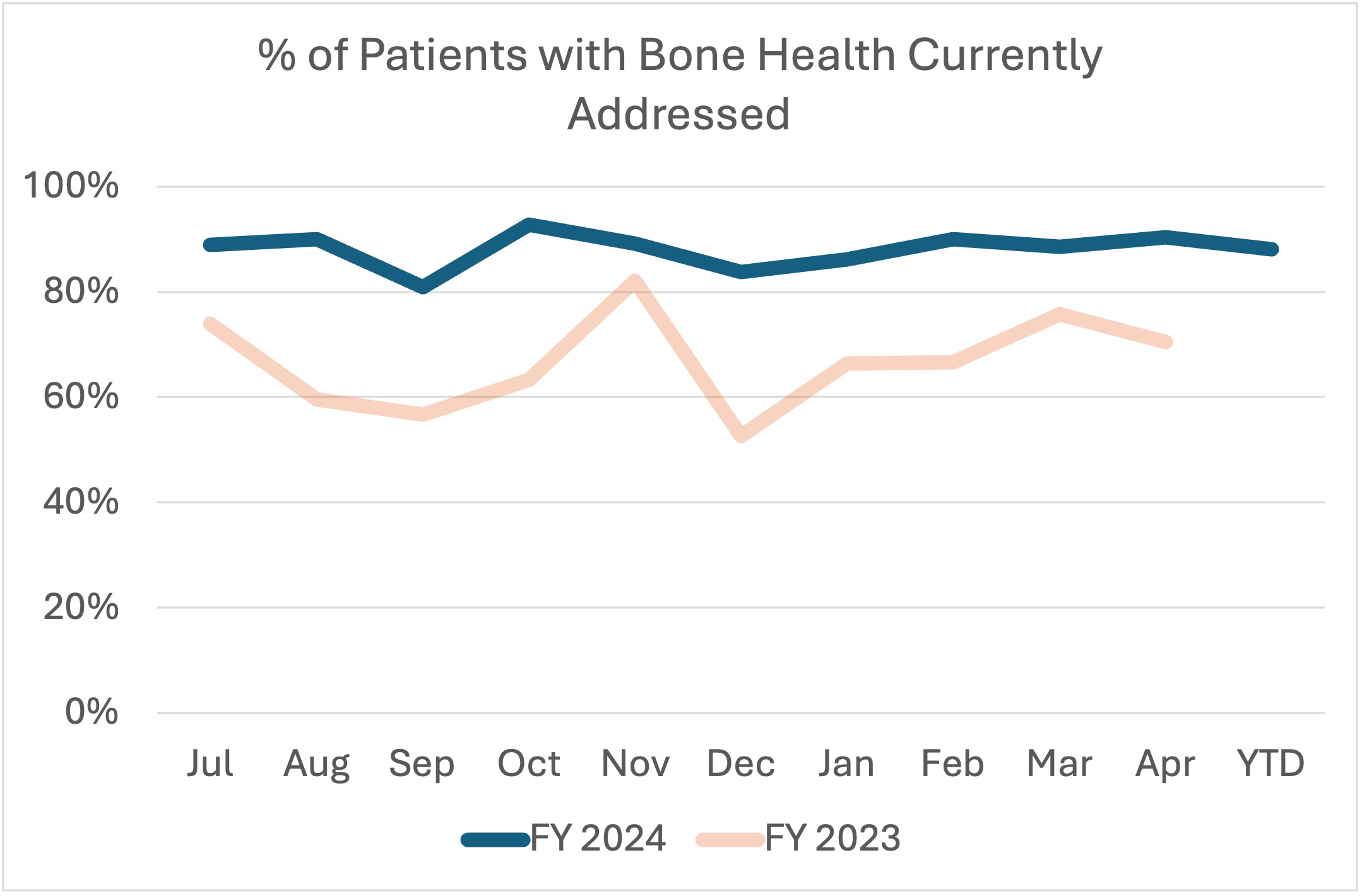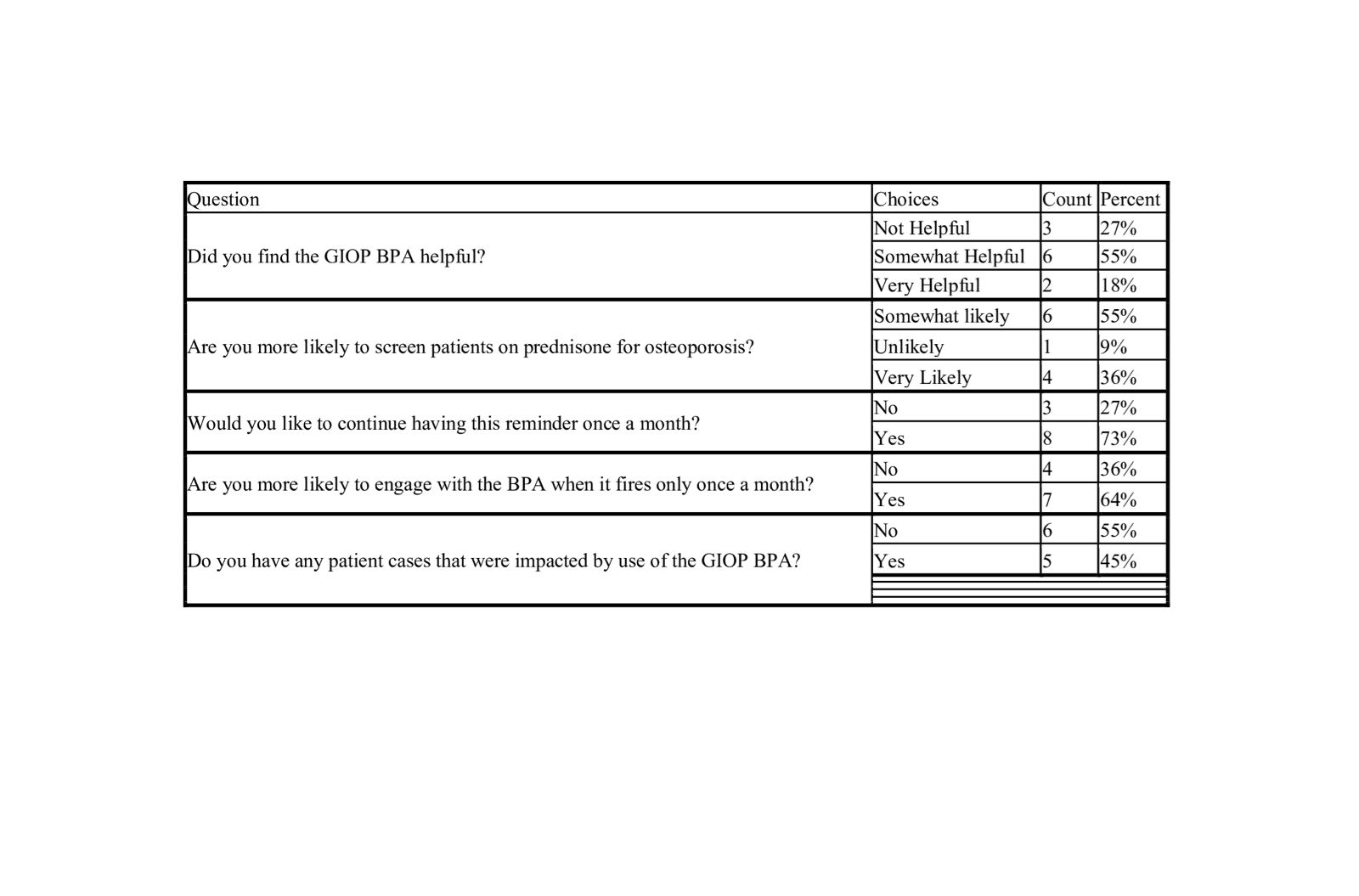Session Information
Session Type: Poster Session B
Session Time: 10:30AM-12:30PM
Background/Purpose: Osteoporosis is the most common bone disease leading to fragility fractures associated with significant morbidity and increased mortality (1). Glucocorticoids (GC) are widely used medications and are an important risk factor for bone loss. Fracture risk is increased with both high and chronic low dose GC therapy with highest rate of bone loss within 3-6 months of starting therapy. The American College of Rheumatology (ACR) has published glucocorticoid induced osteoporosis (GIOP) prevention guidelines to reduce fractures associated with GC therapy (2). Despite availability of guidelines and effective anti-fracture therapy, not all patients on GCs are screened or treated for GIOP. We report on the implementation of an intervention to improve bone health screening in patients on high dose or long-term GC therapy utilizing the electronic health record (EHR) system.
Methods: Within the Division of Rheumatology, patients were identified based on glucocorticoid prescriptions. Among patients receiving long term or high dose GCs, 100 charts were screened for dual Xray absorptiometry (DXA) ordered and reviewed within past 2 years, prescription of anti-osteoporosis medication, and documentation of bone health plan in office notes.
We created an EHR based intervention – best practice alert (BPA) that triggers based on prednisone prescriptions identifying patients >50 years of age receiving prednisone prescriptions of ³10 mg daily as a 90-day supply or with ³ 2 refills. The BPA allows providers to choose to address bone health during the alert, defer to another time, or provide a reason to not address currently. The BPA also provides information on date of last EHR captured DXA results and osteoporosis specific medications. Providers received education regarding GIOP prevention and the purpose of the BPA. Regular performance review was conducted and feedback was provided. Two years after executing the BPA in the EHR, qualifying charts were reviewed to measure change in practice.
Results: Baseline data identified that 35% of patients on glucocorticoids did not have bone health addressed at initiation or during the first 6 months of therapy, as recommended in the GIOP screening guidelines. Follow up data over 2 years showed a sustained increase in the proportion of patients receiving bone health screening from 65.8% to 88.5% in the division. On polling providers, 73% of providers found the BPA helpful and preferred to continue getting the BPA as a monthly reminder.
Conclusion: GIOP screening is critical in patients on high dose and/ or chronic GC therapy. Patients on glucocorticoids are often under screened for bone health despite available recommendations for several reasons, including visit time and complexity. Our goal to improve bone health screening was accomplished using a BPA designed to prompt providers to address bone health for patients on high dose and/or chronic GC therapy. EHR systems can be utilized as a best practice method to improve bone health screening in patients on chronic GC, in turn increasing early identification and treatment of osteoporosis and prevention of fractures.
To cite this abstract in AMA style:
Shahane A, Blum M, Kanoff A, Frey K, Looby S, Sandorfi N. Utilization of Electronic Health Record System to Improve Glucocorticoid Induced Osteoporosis Screening and Treatment [abstract]. Arthritis Rheumatol. 2024; 76 (suppl 9). https://acrabstracts.org/abstract/utilization-of-electronic-health-record-system-to-improve-glucocorticoid-induced-osteoporosis-screening-and-treatment/. Accessed .« Back to ACR Convergence 2024
ACR Meeting Abstracts - https://acrabstracts.org/abstract/utilization-of-electronic-health-record-system-to-improve-glucocorticoid-induced-osteoporosis-screening-and-treatment/


